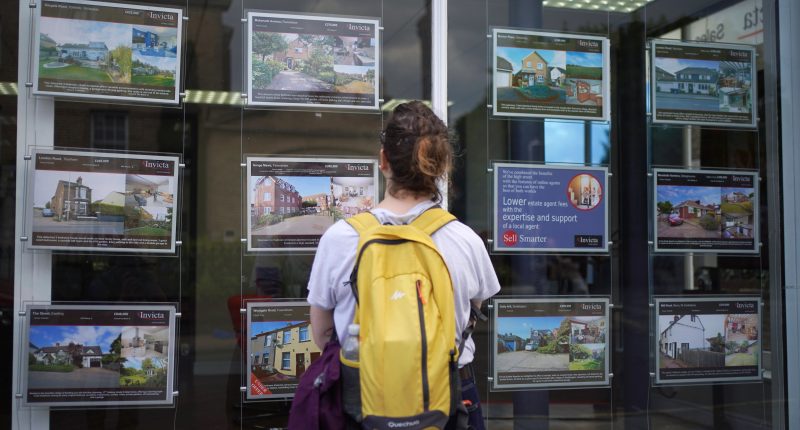FIRST-TIME buyers will get more help to get on the property ladder, the Chancellor has confirmed.
Jeremy Hunt today revealed a raft of government changes in the Autumn Statement.
The Autumn Statement is when the government announces its plans for taxes and spending.
Forecasts for the economy are also published by the Office for Budget Responsibility (OBR).
These forecasts are published twice a year, once at the Budget in the spring and once at the Autumn Statement.
Mr Hunt presents the plans during a speech in the House of Commons.
READ MORE IN MONEY
In his Autumn Statement Jeremy Hunt announced:
In a move to help budding buyers, the Chancellor has announced that the mortgage guarantee scheme is to be extended.
It’s designed to help households with a smaller deposit purchase their homes.
Most read in Money
It was originally announced as part of the 2021 Budget and was set to end on December 31 this year.
That’s now been extended for another 18 months and will end in June 2025.
Under the programme, house buyers need just a £10,000 deposit to be able to afford a £200,000 home.
It enables buyers to take out a mortgage worth 95% loan to value (LTV), meaning only a 5% deposit is needed.
Typically buyers need a 10% deposit and take out a home loan for the remaining 90%.
So far, the scheme has helped over 24,000 households.
But some experts say that while the extension is welcomed, the support doesn’t go far enough.
Karen Noye, mortgage expert at Quilter, said: “Generally, first time buyers will find themselves limited to a maximum of 4.5 times their annual income.
“For those on the average salary this means they can only borrow just over £150k giving the buyer not much choice in the market.
“Saving for a bigger deposit or raiding the Bank of Mum and Dad can therefore offer more choice.”
While Arjan Verbeek, cheif executive at mortgage lender Perenna said: “While any extension to the mortgage guarantee scheme will be welcomed by first-time buyers, it is only a quick fix.
“The reality is that even would-be homeowners with a 5% deposit may find themselves priced out and unable to borrow a large enough loan to get onto the housing ladder.
“This is, in part, due to a mortgage market dominated by short-term fixed rate products.”
How does the scheme work?
Under the scheme, the Government guarantees part of borrowers’ home loans, reducing the risk on the loans.
It means that if the borrower is unable to pay one month, the state will pick up the bill – although it is highly likely there will still be repercussions for borrowers if this happens.
The scheme slashes the minimum amount first-time buyers need to purchase their first homes by half.
For example, a 10% deposit for a £300,00 home is £30,000 but under the programme, buyers would need just £15,000 for a deposit worth 5%.
On a £400,000 house, buyers would need to fork out £20,000 compared to £40,000, or £25,000 instead of £50,000 on a £300,000 home.
The scheme runs for properties worth up to £600,000, which would see the minimum deposit required lowered from £60,000 to £30,000.
But while the scheme will help those struggling to scrape a deposit together, buyers will still need to earn a certain amount to be able to borrow a big enough mortgage.
Lenders will typically lend borrowers up to four or five times their salary.
So to buy a £600,000 house with a 5% deposit, you’d need to have a combined income of a minimum of £135,000 a year.
A major downside of these loans, however, is that the interest rates are often considerably higher than you’d pay with a higher LTV mortgage.
If house prices continue to drop – which is expected next year – this increases the risk of ending up in negative equity.
It means your house is worth less than the mortgage you owe, making it difficult to remortgage at a favourable rate.
You’ll also still be in debt, even if you sell the property.
What other schemes are available?
The mortgage guarantee scheme isn’t the only programme available to first-time buyers.
Here are a few others you can take advantage of today.
Shared ownership
Shared ownership lets first-time buyers purchase a portion of the equity in a property if they can’t afford to take out a mortgage for the total value of the home.
You’ll co-own your home with a housing association, which will charge you rent on its portion of the property.
Buyers will find they’ll likely need to buy a new-build home.
Buyers must purchase between 10% and 75% of the property to use the initiative, and they can then “staircase” – buy more shares in instalments – until they own 100% of it.
You can put down a deposit of just 5% using a shared ownership scheme.
While it can make buying a home more affordable, there are a few disadvantages.
You don’t have as much freedom when it comes to selling up – if you own less than 100%, your housing association will get a set period of time to find a buyer.
That means you won’t be able to accept a higher offer from someone else.
Or, you might have to sell it back to the housing association instead of putting it on the market.
There are also fewer lenders offering shared ownership mortgages compared with standard ones.
This means there isn’t much competition to offer decent rates.
Help to Build
The government last year unveiled its Help to Build scheme to first-time buyers.
It means you’re able to build your own home with just a 5% deposit.
The government can give you an equity loan based on the estimated costs to buy the plot of land and build your home.
The loan amount can be between 5% to 20%, and up to 40% in London.
It will make building your own home more affordable, as previously, you needed a deposit worth around 25% of land and building costs.
With a home costing £400,000 to build, you would need to raise £100,000 typically. At 5% this would be just £20,000.
But there are some downsides.
Building costs can often run away – which means you could go over budget and end up forking out much more than you want to.
It could also be challenging to find land to buy and build on – including the faff of getting planning and a mortgage.
Companies offering loans with 5% deposits
There are companies offering loans to first-time buyers with just 5% deposits to help them boost their home budget
If you have saved up enough for a 5% deposit, you can apply for a home loan from Proportunity.
It works in a similar way to Help to Buy – but the key differences are that you can get a loan to cover up to 25% of the total value of a property, and it doesn’t have to be a new build.
You can repay your loan at any point – for example, you could choose to pay it back at all once when you sell up.
Ahauz is another company offering equity loans to buyers with a 5% deposit.
Again, you can get up to 25% of the property value up to £150,000.
But a word of warning – alternative finance firms can often charge significant interest rates offering loans like these.
Plus, some lenders might not lend you a mortgage using an equity loan like this – so you might not get the best deal.
You can also join our new Sun Money Facebook group to share stories and tips and engage with the consumer team and other group members.










